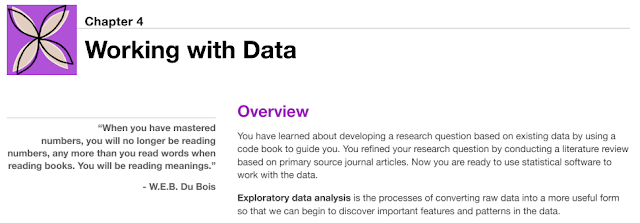Passion-Driven Statistics is a grant-funded, FREE resource that teaches the basic of statistics, including the basics of all of the stuff you need to know to conduct good research (data management, literature review, etc.). It bills itself as "project-driven" and is super, duper applied, which is an approach I love.
I also love this resource because it contains a lot of good information for novices that I haven't seen packaged this way or in one place:
Important lessons pertaining to the research process and data collection: The book is written to take you through a research project, and includes guidance for performing a literature review, writing a sound codebook, data management, etc. This is important information that can be overlooked in a research method class but everyone assumes you know. Even if you don't use their entire text in your class, I think these chapters that cover some of the best practices in research could be very useful in a research methods class.
A chapter devoted to mediation. With all the code to go along with it.
So many examples of code: It provides instruction for, like, any stats software you could possibly use in your class (SAS, R Python, Stat, SPSS).
^I imagine this would also be very helpful if you are an old hand at data analysis but you are interested in learning a new stats coding language.
For more information, contact Lisa Dierker, ldierker@wesleyan.edu.
You can download the whole stinking book or view it online. And the PDF is concise and short, given the amount of material it covers. Why so short? Because it is lousy with links to Youtube videos, mini-assignments, instructions for reporting different statistical tests, etc.
I also love this resource because it contains a lot of good information for novices that I haven't seen packaged this way or in one place:
Important lessons pertaining to the research process and data collection: The book is written to take you through a research project, and includes guidance for performing a literature review, writing a sound codebook, data management, etc. This is important information that can be overlooked in a research method class but everyone assumes you know. Even if you don't use their entire text in your class, I think these chapters that cover some of the best practices in research could be very useful in a research methods class.
 |
| One example of original, crucial content I haven't seen elsewhere at the novice level: Developing a research project based upon archival data. |
A chapter devoted to mediation. With all the code to go along with it.
So many examples of code: It provides instruction for, like, any stats software you could possibly use in your class (SAS, R Python, Stat, SPSS).
 |
| For example, how to conduct a correlation in all of the leading stats programs |
^I imagine this would also be very helpful if you are an old hand at data analysis but you are interested in learning a new stats coding language.
For more information, contact Lisa Dierker, ldierker@wesleyan.edu.

Comments
Post a Comment